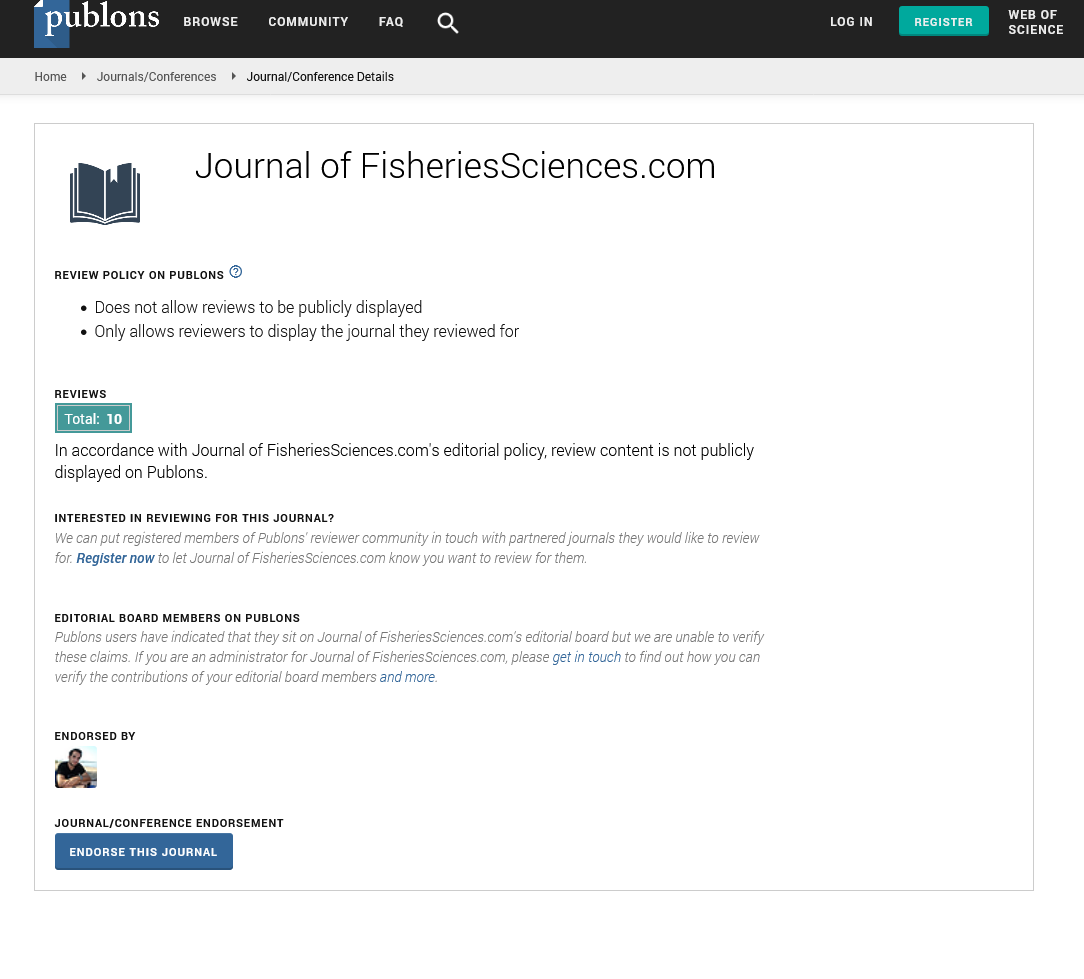Perspective - (2023) Volume 17, Issue 5
Unveiling the secrets of the deep: The enigmatic world of oceanography
Indrajit Kar*
Department of Aquaculture, Karnataka Veterinary Animal and Fisheries Sciences University, Karnataka, India
*Correspondence:
Indrajit Kar, Department of Aquaculture, Karnataka Veterinary Animal and Fisheries Sciences University, Karnataka,
India,
Email:
Received: 15-Sep-2023, Manuscript No. IPFS-23-14266;
Editor assigned: 20-Sep-2023, Pre QC No. IPFS-23-14266;
Reviewed: 04-Oct-2023, QC No. IPFS-23-14266;
Revised: 19-Oct-2023, Manuscript No. IPFS-23-14266;
Published:
27-Oct-2023
Introduction
The earth's oceans are a vast, mysterious realm that covers
over 70% of the planet's surface. From the surface to the
darkest depths, the oceans hold a wealth of secrets waiting
to be unraveled. Oceanography is the scientific discipline
dedicated to studying these intricate ecosystems and
understanding the complex interplay of physical, chemical,
and biological processes that govern them. In this article,
we will delve into the fascinating world of oceanography,
exploring its history, key areas of study, and the latest
advancements that continue to reveal the enigmatic beauty
of our oceans.
Description
A historical perspective
Oceanography has a rich history that spans millennia, with explorers, sailors, and naturalists making vital contributions to our understanding of the oceans. Ancient seafarers like the Polynesians, Vikings, and early navigators were among the first to venture into the open sea, contributing to early navigational knowledge.
The systematic study of oceanography, however, began in the late 19th and early 20th centuries with the development of modern technology. The HMS Challenger Expedition (1872-1876) marked a turning point in oceanographic research, setting the stage for the scientific exploration of the oceans. The expedition mapped the ocean floor, collected numerous samples, and discovered a wealth of new species, shedding light on the diverse and complex nature of the oceans.
Key areas of study in oceanography
Oceanography is a multidisciplinary field encompassing several branches, each offering unique insights into the world beneath the waves. Here are some of the key areas of study within oceanography:
Physical oceanography: Physical oceanography focuses on the study of the physical properties and processes of the ocean, including temperature, salinity, currents, tides, and waves. Understanding these factors is crucial for predicting weather patterns, ocean circulation, and the impacts of climate change on marine environments.
Chemical oceanography: Chemical oceanography vestigates the composition and distribution of chemical substances in the ocean, such as dissolved gases, nutrients, and pollutants. This branch is essential for understanding the ocean's role in global biogeochemical cycles and its influence on climate.
Biological oceanography: Biological oceanography explores marine life, from the tiniest phytoplankton to the largest whales. Researchers in this field examine the distribution, behavior, and interactions of marine organisms, shedding light on biodiversity, food webs, and the ecological dynamics of the ocean.
Geological oceanography: Geological oceanography studies the geology of the ocean floor, including the formation of seafloor features like trenches, ridges, and abyssal plains. Researchers in this field also investigate sediment deposition, plate tectonics, and the history of earth's oceans.
Marine technology and exploration: Advancements in technology have revolutionized oceanographic research. Submersibles, Remotely Operated Vehicles (ROVs), and Autonomous Underwater Vehicles (AUVs) enable scientists to reach extreme ocean depths and collect data from remote areas. These tools are instrumental in discovering new species and understanding previously inaccessible ecosystems.
The challenges of ocean exploration: Despite the tremendous progress made in oceanography, the oceans remain largely uncharted and enigmatic. The challenges of exploring this vast and dynamic environment are significant, including:
High pressure and extreme temperatures: As you descend deeper into the ocean, water pressure increases dramatically, and temperatures can drop to near freezing. Exploring the deep sea requires specialized equipment that can withstand these harsh conditions.
Limited access: The deep sea is a remote and challenging environment to reach. It is often difficult and expensive to deploy equipment and researchers to deep-sea locations, which limits the extent of our knowledge.
Biodiversity and unique ecosystems: The deep ocean hosts an incredible diversity of species, many of which are still undiscovered. The fragile ecosystems of the deep sea can be easily disturbed by human activity, making conservation and responsible exploration critical.
The Impact of oceanography
Oceanography plays a vital role in our lives, influencing everything from the weather we experience to the food we eat. Here are some ways in which oceanography impacts our world:
Climate research: Oceanography helps scientists understand the role of the oceans in regulating climate. Oceans absorb and store vast amounts of heat and carbon dioxide, making them a key factor in climate change. Studying the oceans is crucial for predicting and mitigating the effects of climate change.
Weather prediction: The study of ocean currents and temperatures is essential for weather forecasting. Oceanographers provide valuable data used by meteorologists to predict storms, hurricanes, and other weather events.
Fisheries and food security: Understanding ocean ecosystems and the distribution of marine life is essential for sustainable fisheries management. Oceanographers work to ensure that we can continue to harvest seafood without depleting marine resources.
Resource exploration: Oceanography plays a role in the exploration and extraction of valuable resources from the ocean, such as oil, gas, and minerals. Responsible resource management is a crucial aspect of this field.
Conservation and environmental protection: The study of marine ecosystems and the impacts of human activities on the oceans informs conservation efforts and environmental policy. Protecting these ecosystems is vital for maintaining biodiversity and the overall health of the planet.
The future of oceanography: As technology advances and our understanding of the oceans deepens, the future of oceanography is filled with exciting possibilities. Here are a few developments to look forward to:
Deeper exploration: Advancements in deep-sea exploration technology will enable researchers to reach even greater ocean depths, uncovering new species and ecosystems. The exploration of extreme environments, such as hydrothermal vents and the Mariana Trench, will continue to expand our knowledge.
Climate change mitigation: Oceanographers will play a crucial role in addressing climate change by studying the oceans' capacity to sequester carbon and investigating potential geoengineering solutions to mitigate the impacts of rising temperatures.
Marine conservation: Oceanographers will continue to advocate for marine conservation, working to protect vulnerable ecosystems, reduce plastic pollution, and support efforts to combat overfishing.
Technological innovations: The development of innovative tools and technologies for ocean exploration will open new avenues for research and discovery. Artificial intelligence, robotics, and advanced sensors will enhance our ability to study the oceans.
Conclusion
Oceanography is a captivating field that unlocks the
mysteries of the world's largest and least explored
ecosystems. From the deep sea to the sunlit surface, the
oceans harbor a diverse array of life, drive climate patterns,
and offer a wealth of resources. As we delve deeper into
the oceans, embracing technological advancements and
increasing our understanding of this enigmatic world, we
gain the knowledge and tools needed to address pressing
environmental challenges and ensure the long-term health
of our planet. Oceanography reminds us of the
importance of cherishing and protecting the vast and
beautiful realm that covers so much of our world.






